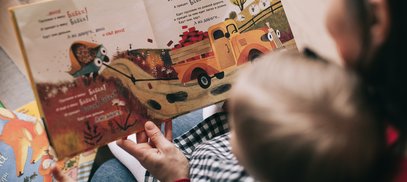Helen Williams, manager in the National Literacy Trust Yorkshire Coast team, shares why reading is so important for children's mental health.
In 2018 I became the primary carer for my young niece. Everything she knew about life had changed overnight and the disruption and shock of it all was almost too much to bear. It was a big transition for me too. On her first day of school I sent her in wearing a pinafore without a shirt.
Somehow, we survived, but without books, stories and songs I’m not sure we would have.
Throughout my life I’ve been in many different occasions where I’ve soothed and cared for children and young people by using books and stories as my main tools. When the part of our reality that is out of control becomes too much to bear, the joyful escape provided by reading and making up stories can be magical. I myself was read to most nights before bed and I had no idea what a gift it was to my mental wellbeing – I just loved that time with my caregivers and listening to the rhythm of their voice.
I didn’t know this back then, but the benefits young readers can gain from reading for pleasure can’t be underestimated. Research from the National Literacy Trust has shown us that children and young people who like to read are three times more likely to have better mental health than those who don’t.
Reading for just 10 minutes a day can have astonishing benefits. Not only is it a brilliant way to relax and unwind, reading can also help boost your mood, provide an escape from the pressures of life and even reduce stress levels.
Book ownership also plays a huge part in getting children and young people to read for the joy of it. Over 50% of children who have a book of their own say they enjoy reading, compared to just 21% of those who don’t own a book.
Despite this, research in 2020 showed us that levels of reading for enjoyment amongst children and young people had reached a 15-year low. While the latest figures show improvement, with only 3 in 10 children and young people admitting to reading anything daily throughout 2021, it’s clear there is still work to be done.
As the Our Stories Hub Manager, I’m on a mission to make sure that no child across the North Yorkshire Coast grows up without the opportunity to discover the joys and benefits that reading for pleasure can bring.
This Children’s Mental Health Week I’ll be visiting Gallow’s Close community centre in Scarborough to donate some books to a toddler group and talk about reading for wellbeing. I also encourage the families, schools, children and young people in our audience to take part in our bi-annual #Take10ToRead event – with the next one coming up in May.
There are so many books and stories that allow children to explore their internal world and make sense of difficult emotions such as sadness, anger and anxiety. I was lucky enough to work in the mental health sector while I was caring for my niece and was given recommendations from friends, family, peers and child and mental health experts.
Download my list of recommendations to read this Children's Mental Health Week here.
